Review: The Crucible
By Joe McFadden
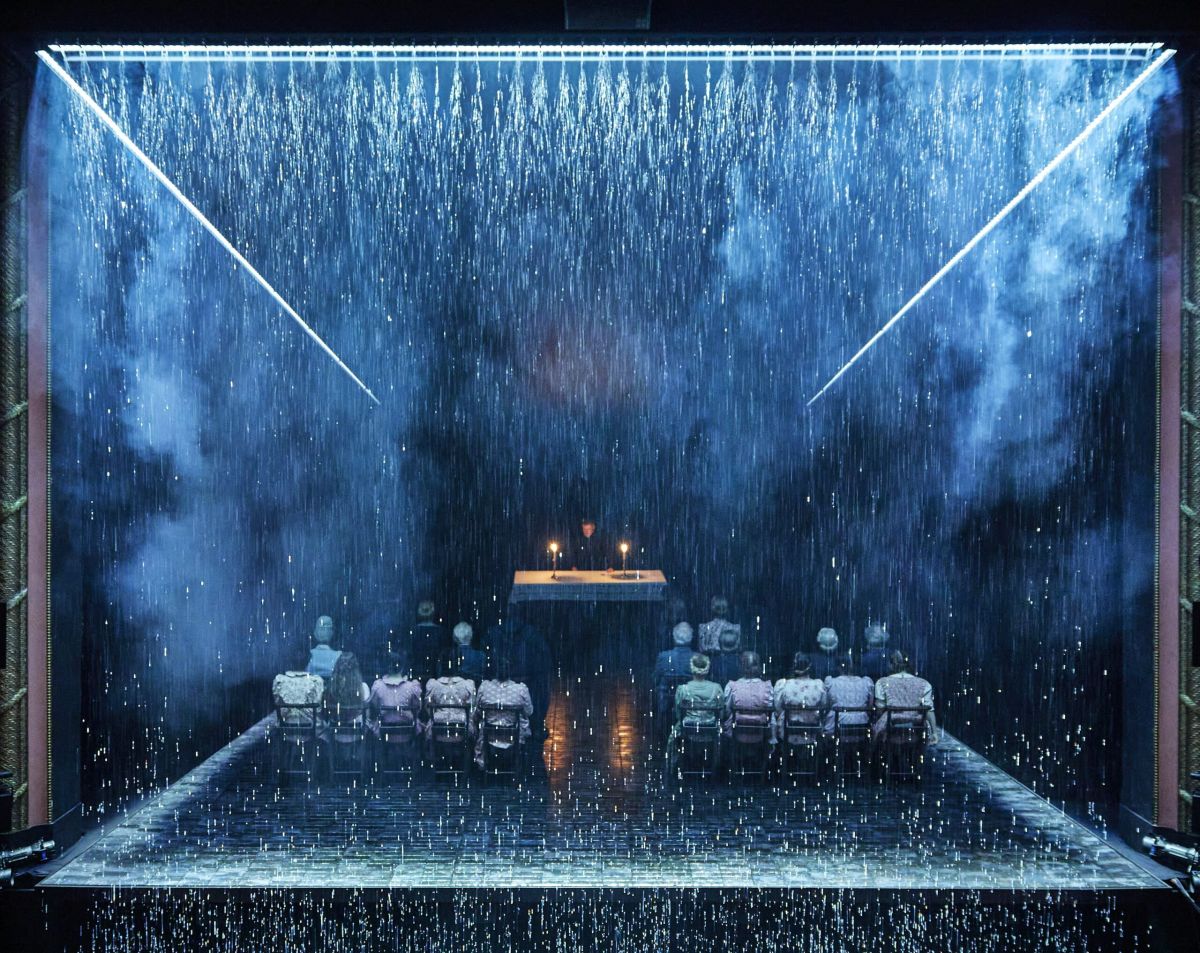
A powerful indictment of conformity, corruption, and greed, Arthur Miller’s The Crucible, currently playing at the West End’s Gielgud Theatre, is a must-see drama made all the more necessary by its continued relevance. Set in 1692 during the Salem Witch Trials, The Crucible follows the inhabitants of a small New England settlement gripped by mass hysteria after a group of young girls, led by Abigail Williams (Milly Alcock), are believed to have summoned the devil, causing accusations of witchcraft to take over the town.
A restaging and partial recasting of the National Theatre’s 2022 production, Miller’s play is brought to life by a superb ensemble. Alongside Alcock, fresh off HBO’s acclaimed Game of Thrones prequel House of the Dragon and making her West End debut, Brian Gleeson stars as John Proctor, a flawed farmer who serves as the play’s protagonist, whilst Caitlin Fitzgerald portrays his wife, Elizabeth, a pious, dignified woman who acts as Miller’s moral anchor.
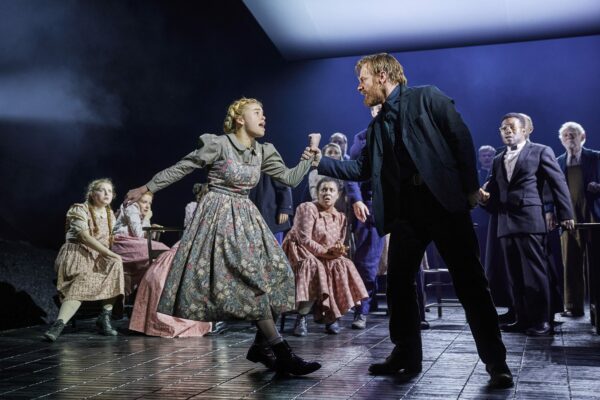
Photo: Brinkhoff Moegenburg
Rounding out the cast are Nick Fletcher as Reverend Samuel Parris, Fisayo Akinade as Reverend John Hale, Nia Towle as Mary Warren, Karl Johnson as Giles Corey, Tilly Tremayne as Rebecca Nurse, Nadine Higgin as Tituba, Raphael Bushay as Ezekiel Cheever, and Matthew Marsh as Deputy Governor Danforth.
Gleeson embodies John Proctor, deftly finding the balance between self-hatred and righteous fury. As the town goes further and further down the rabbit hole of witchcraft, settling old scores and increasingly losing their collective mind, Gleeson plays Proctor with a heroic bent but never forgets his sins, namely a lecherous affair with Abigail, creating a fully-realised version of Miller’s flawed protagonist and the antithesis to the corrupt officials who ruthlessly persecute the townspeople.
Alcock is similarly strong as Abigail, effortlessly holding her own against Salem’s patriarchy and proving to be a superb verbal sparring partner, although her true talents shine in the play’s third act when she leads the girls in a collective deception, accusing Mary Warren (a brilliant turn by Nia Towle) of sending out her spirit to attack them. The physicality of Alcock’s performance (and the rest of the girls who form a perverted Greek chorus, both for the characters and audience) marks a memorable moment as the girls crawl around the stage, violently convulsing as if they were possessed whilst Caroline Shaw’s score drowns out Proctor’s charges of theatre and the court’s indignation.
Although Shaw’s score is effective, at times the production relies too heavily on its sound and lighting, undermining the power of Miller’s writing during important scenes. For example, at the end of act one the stage erupts into a cacophony of accusations as Abigail and the girls claim they’ve seen several of Salem’s citizens collaborating with the Devil. A powerful moment in its own right, the heavy use of music and decision to record the accusations, mixing them together to assault the audience’s senses, actually undermines the gravity and clarity of the sequence.
By emphasising the hysteria, particularly the mass element of it, director Lyndsey Turner and sound designer Tingying Dong remove the weight of the girl’s accusations, undercutting the drama when it should be at the forefront of the act’s climax. Some lines are also played for laughs and presented as quips, breaking up the drama and interrupting the play’s atmosphere. Karl Johnson’s memorable turn as Giles Corey, the town curmudgeon with a heart of gold, provides enough genuine humour that the other comedic moments which elicited belly laughs from the audience felt unnecessary.
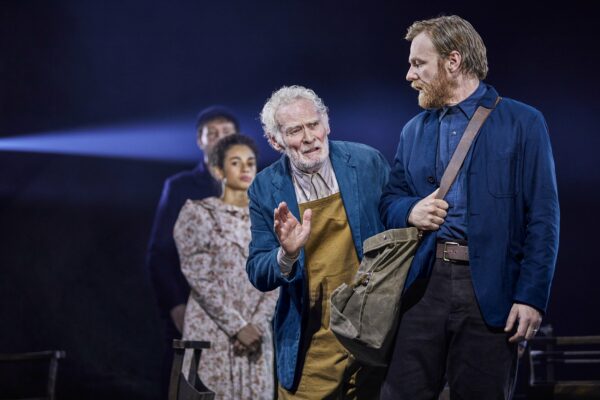
Whilst the play does have its humorous moments, it is first and foremost a drama, and, although Turner and co never forget that, their overindulgence in its funnier elements does prove detrimental to the overall experience. However, this is also an audience issue as much as a creative one and ultimately these are very minor gripes over a production which, for the most part, inhabited the spirit of Miller’s writing and featured some tour-de-force performances from its leads in Gleeson and Alcock. The entire ensemble gave commanding performances and utilised space excellently, clearly bolstered by Es Devlin’s fantastic set design which elevated the play and meant the action on stage was as exciting as Miller’s dialogue straight off the page.
Despite being set in colonial America and Miller’s stage directions only calling for very basic furnishings, Devlin’s sets were artistic as well as being functional. A particular highlight featured in act four when the chairs from the court anteroom were flipped to create the jail’s jaggedy architecture, a welcome departure from the traditional projections of bars onto a background. Coupled with Tim Lutkin’s creative lighting, the sets managed to evoke a sense of time and place without being overbearing or needlessly complex, casting long shadows across the stage like spectres of death as the play’s climax drew nearer and nearer.
The stage was often bathed in cold, almost blue lights, simply yet subtly communicating Salem’s building paranoia and puritanical society without looking like a period drama. Of course, the central technical element was the rain feature at the front of the stage, immediately unsettling the audience and creating an eerie atmosphere which was only heightened by London’s stuffy summer. Although undoubtedly a gimmick, the rain feature worked, yet again highlighting how this production continuously raised the bar with its subtle yet imaginative innovations, thus providing an excellent model for how to update a play without completely reinventing the source material.
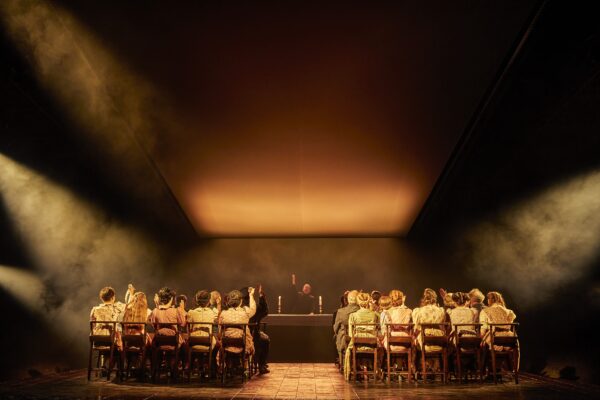
Photo: Brinkhoff Moegenburg
As a work of literature The Crucible’s origins lie in the McCarthyist witch hunts of 1950s America where artists, including Miller, were persecuted for expressing political opinions which were even mildly critical of capitalism and America’s actions during the Cold War. Miller’s dialogue is elaborate yet snappy; piercing but perceptive. His characters are all flawed individuals with no heroes or villains, only protagonists and antagonists. Indeed, three standout supporting performances are Nick Fletcher as Reverend Parris, Fisayo Akinade as Reverend Hale, and Matthew Marsh as Deputy Governor Danforth, the three furies of Salem’s suffocating theocracy and the source of Miller’s scourge.
Fletcher’s Parris is sliminess personified, perfectly embodying the self-serving Minister whilst Akinade’s naïve, bookish Hale evolves into the disillusioned preacher of act four. Likewise, Marsh’s Danforth anchors the production’s second half, encapsulating the moral corruption and self-righteousness which fuelled the witch hunts, much in the same way as Senator McCarthy led the House Committee on Un-American Activities as both prosecutor and preacher.
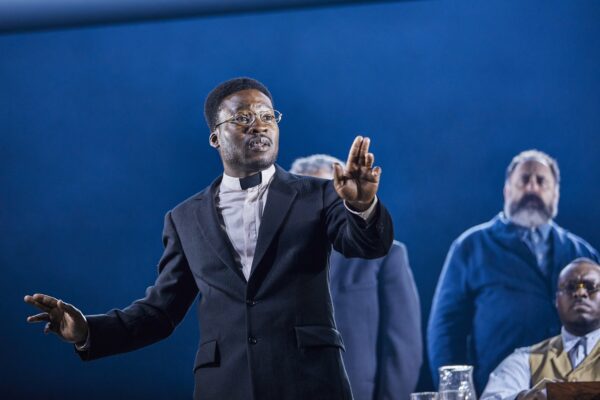
Photo: Brinkhoff Moegenburg
As Miller’s play proves, theocracy is not an aberration but merely a feature of government and civil society. In 1692 it took the form of literal witch hunts against an imagined enemy, stoking divisions more than it strengthened security. In 1953 it manifested itself once again, not as the rule of the Church but as the elimination of dissent and persecution of artistic freedom. Ideology replaced religion as the prosecutor’s moral authority; subpoenas supplanted sermons as their method of delivery. In 2023, theocracy is once again a plague on all our houses.
Feelings have replaced facts. Partisanship has become a synonym for politics and elections are no longer free and fair but feared and fanatical. Whilst it is not a literal rule of religion, politics has become a religion and government has been reduced to an exercise in worship, not of a particular creed or sect or even a specific deity, but the worship of ideology and the ruthless, systematic elimination of any ideas to the contrary.
In a political environment where the far-right cries “witch hunt” every time its members face consequences for their actions and McCarthyism has returned to the Labour Party, The Crucible is as relevant as it was 70 years ago. Everything old is new again and Miller’s writing is a testament to the all-too human truth that all of us are deeply flawed, hypocritical individuals masquerading as the righteous.
As a production, Lyndsey Turner’s The Crucible is a stunning experience littered with superb performances and a fresh take on a modern classic. As a work of art, however, The Crucible is must-see theatre; a timeless morality play which takes on new meanings as the corruption of our leaders and failings of our systems are continuously laid bare for all to see, or, more dangerously, wilfully ignore.
The Crucible is playing at the Gielgud Theatre until September 2.







